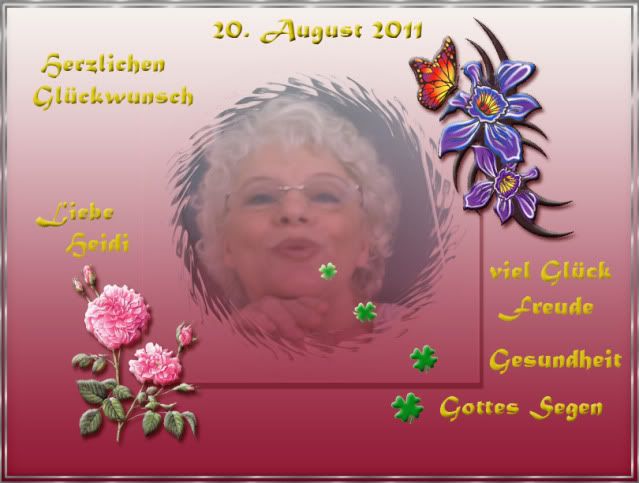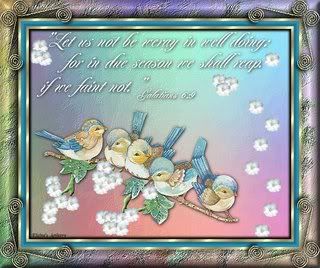
| Rating: | ★★★★★ |
| Category: | Other |


Bkg. Courtesy of
Christian Backgrounds
 Liebe Heidina
Liebe Heidina 
Mitten im "Packen" will ich es nicht versäumen, dir von ganzem Herzen zu deinem Geburtstag zu gratulieren!
Möge dir Gottes Schutz und Gnade in deinem neuen Lebensjahr weiterhin in guter Gesundheit,
Zufriedenheit und Freude im Herzen geschenkt sein!

Für reichlich Sonne hat Petrus gesorgt- und in diesem Sinne wünschen wir dir einen wunderbaren Geburtstag!
Mit frohen und ganz herzlichen Grüssen
deine Liliane  und Heinz
und Heinz  mit
mit  Suny
Suny

Das Christentum überzeugt(e) dort, wo es diese konkrete Liebe Gottes zur Entfaltung bringt und brachte. Die Entfaltung der christlichen Religion vollzieht sich deswegen überall dort, wo Menschen dieser Liebe Einfluss gewähren. Das Betrachten der Muttergottes, das Vertrauen auf ihre Fürsprache und die Meditation über ihr Austragen und Mittragen des göttlichen Sohnes bilden Öffnungen, wodurch Christus selber auch heute in die Welt kommt. Die gesunde Maria-Verehrung ermöglicht demnach eine fortlaufende und damit gegenwärtige Offenbarung Christi. Maria war offen für das Neue. Sie vermittelt, ermöglicht Offenheit und Bereitschaft.
Wer sich mit Maria verbindet, verbindet sich mit Christus. Ein solcher Mensch darf Heil und Heiligung an Leib und Seele erfahren. Er bringt seinen göttlichen Geist in Einklang mit der göttlich-geistigen Welt. Auf diesem Hintergrunde ist auch die Weihe unserer Kirche in Wolfwil zu sehen. Wir feiern unsere Würde als Menschen mit Leib, Seele und Geist. Wir feiern letztlich, dass wir in der Liebe Gottes bleiben und diese in Ewigkeit mit uns ist. Wir feiern unsere Erhaltung und „Erneuerung“ durch Gott.
Pfr. Urs-Beat Fringeli
Geschichte des Festes
Schon früh glaubten die Christen. dass Maria, die Mutter Jesu, am Ende ihres Lebens mit Leib und Seele in die Herrlichkeit Gottes aufgenommen wurde. Diese Vorstellung betont die besondere Würde, die Maria als Mutter des Herrn zusteht und ihren Anteil am Werk und der Erlösungstat ihres Sohnes.
Durch ihr JA konnte die Menschwerdung Gottes geschehen, in ihr und durch sie konnte Jesus geboren werden.
So findet man Hinweise auf den Festgedanken von Maria Himmelfahrt schon in der Frühzeit der Kirche. Bereits beim Konzil von Ephesus in Jahre 431 wurde Maria der Titel „Gottesgebärerin“ zugestanden. Die römische Kirche feiert das Fest seit dem 7. Jahrhundert.
Die Wurzeln dieses Festes reichen bis in ins 5. Jahrhundert zurück. Es betont die besondere Würde, die die Gemeinschaft der Kirche Maria schon seit je her zugedacht hat.Durch die Verkündigung des Dogmas von der leiblichen, also ganzheitlichen Aufnahme Mariens in den Himmel im Jahre 1950 wurde seine Bedeutung nochmals gestärkt.
Darstellungen von Maria Himmelfahrt sind jenen von Christi Himmelfahrt teilweise sehr ähnlich. Luft, „Wolken“, umgeben die Gestalt von Maria, die sich zum Himmel aufschwingt.| Start: | Aug 14, '11 |
for masuzette's contacts |


| Start: | Aug 12, '11 |


Bkg. Courtesy of
Christian Backgrounds
| Start: | Aug 11, '11 |


Evangelium nach Matthäus 14,22-33.
Gleich darauf forderte er die Jünger auf, ins Boot zu steigen und an das andere Ufer vorauszufahren. Inzwischen wollte er die Leute nach Hause schicken.
Nachdem er sie weggeschickt hatte, stieg er auf einen Berg, um in der Einsamkeit zu beten. Spät am Abend war er immer noch allein auf dem Berg.
Das Boot aber war schon viele Stadien vom Land entfernt und wurde von den Wellen hin und her geworfen; denn sie hatten Gegenwind.
In der vierten Nachtwache kam Jesus zu ihnen; er ging auf dem See.
Als ihn die Jünger über den See kommen sahen, erschraken sie, weil sie meinten, es sei ein Gespenst, und sie schrien vor Angst.
Doch Jesus begann mit ihnen zu reden und sagte: Habt Vertrauen, ich bin es; fürchtet euch nicht!
Darauf erwiderte ihm Petrus: Herr, wenn du es bist, so befiehl, daß ich auf dem Wasser zu dir komme.
Jesus sagte: Komm! Da stieg Petrus aus dem Boot und ging über das Wasser auf Jesus zu.
Als er aber sah, wie heftig der Wind war, bekam er Angst und begann unterzugehen. Er schrie: Herr, rette mich!
Jesus streckte sofort die Hand aus, ergriff ihn und sagte zu ihm: Du Kleingläubiger, warum hast du gezweifelt?
Und als sie ins Boot gestiegen waren, legte sich der Wind.
Die Jünger im Boot aber fielen vor Jesus nieder und sagten: Wahrhaftig, du bist Gottes Sohn.
Auszug aus der liturgischen Übersetzung der Bibel
Kommentar zum heutigen Evangelium
Hl. Johannes Chrysostomos (ca. 345-407), Priester in Antiochia und später Bischof von Konstantinopel, Kirchenlehrer
Homilien zum Matthäusevangelium, Nr. 50, 1-2
«O du Kleingläubiger, warum hast du gezweifelt?»
Die Jünger sind wieder Spielzeug der Wellen und ein weiterer Sturm, dem ersten gleich (Mt 8,24), bricht los. Damals hatten sie jedoch Jesus bei sich im Boot, während sie diesmal allein und sich selber überlassen sind... Ich glaube, dass der Retter auf diese Weise ihre Herzen wieder beleben wollte, die schläfrig geworden waren. Er versetzte sie in Todesangst, verstärkte in ihnen das Verlangen nach seiner Anwesenheit und bewirkte, dass sie ständig an ihn dachten. Deshalb kam er ihnen auch nicht sofort zu Hilfe, sondern „kam in der vierten Nachtwache zu ihnen; er ging auf dem See“...
Petrus, der immer temperamentvoll und den anderen Jüngern immer einen Schritt voraus war, sagte zu ihm: „Herr, wenn du es bist, so befiehl, dass ich auf dem Wasser zu dir komme“... Er sagte nicht zu ihm: „Befiel, dass ich auf dem Wasser gehen soll“, sondern: „dass ich zu dir kommen soll“; denn keiner liebte Jesus so wie er. Nach der Auferstehung Jesu tat er dasselbe: er konnte es nicht ertragen, nicht schneller als die anderen zu sein: So sprang er in das Wasser, um ihnen zuvor zu kommen und seiner Liebe zu Christus zu genügen... Petrus stieg also aus dem Kahn und ging auf Jesus zu, glücklicher darüber, ihm näher zu kommen als darüber, auf dem Wasser gehen zu können. Als er aber mit der größten Gefahr, nämlich der, die von dem Wasser ausging, fertig geworden war, fiel er einer weniger großen Gefahr, nämlich der, die ihm vom Sturm drohte, beinahe zum Opfer. So ist die menschliche Natur: wir überstehen ernste Gefahren und erliegen dann kleineren Gefahren... Petrus war noch nicht frei von jeglicher Angst, obwohl Christus in seiner Nähe war. Es nützt also nichts, Christus neben sich zu haben, wenn man ihm nicht durch den Glauben nahe ist. Das machte deutlich, welche Distanz zwischen dem Meister und dem Jünger bestand...
„O du Kleingläubiger, warum zweifelst du? Wenn sein Glaube nicht schwächer geworden wäre, hätte Petrus den Wind leicht aushalten können. Und der Beweis dafür: Jesus greift nach Petrus und lässt den Wind weiter wehen... Christus verfährt mit Petrus wir eine Vogelmutter mit ihrem Jungen, das sich vorzeitig daran gemacht hat, das Nest zu verlassen und nun herauszufallen droht: sie hält es mit ihren Flügeln fest und bringt es ins Nest zurück.
Wednesday
Scripture from today's Liturgy of the Word:
Exodus 34:29-35
Psalm 99:5, 6, 7, 9
Matthew 13:44-46
“The kingdom of heaven is like treasure hidden in a field. When a man found it, he hid it again, and then in his joy went and sold all he had and bought that field.
“Again, the kingdom of heaven is like a merchant looking for fine pearls. When he found one of great value, he went away and sold everything he had and bought it."
(Matthew 13:44-46A)
A reflection on today's Sacred Scripture:
It's gratifying to hear stories of parental sacrifice for children. We become horrified when the opposite is true. Jesus knew the depth of love the Canaanite woman had for her daughter as she persevered in requesting help from Jesus.
In an era when we expect "instant" everything, with drive-thru's for food and banking, with text messages and more, we have fewer occasions in life to be patient and to persevere in our prayer life. Jesus challenged the faith of the Canaanite woman and He rewarded her by healing her daughter.
We realize that Jesus knows our needs even before we recognize them ourselves. He waits for us to turn toward Him always, not just because of our needs, but because it is the relationship that is of primary importance. He does not force Himself on any of us.
Let us not miss the opportunities life provides to turn to Him as His heart is open to us around the clock. What a friend!

The Catholic Calendar
and Daily Meditation
Bkg. Courtesy of Aalie
| Start: | Aug 1, '11 |